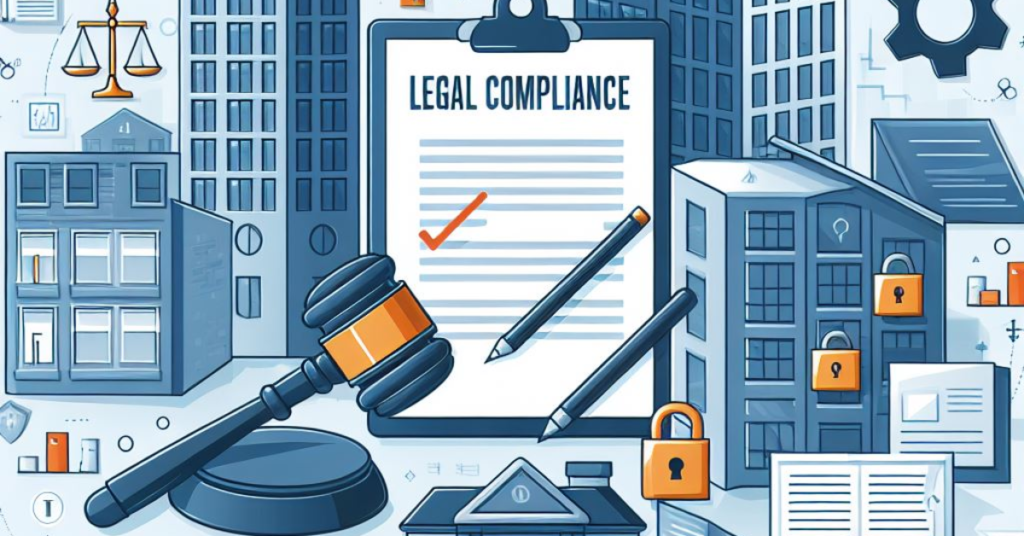Legal Compliance in Strata Management: Updates and Best Practices in 2024
Introduction: Legal compliance is a cornerstone of effective strata management, ensuring that communities operate within the bounds of the law while safeguarding the interests of owners and residents. In this guide, we’ll delve into the latest updates in strata management legislation, explore best practices for maintaining legal compliance, and highlight key strategies for resolving disputes and addressing compliance issues in 2024.
Understanding Strata Management Legal Obligations
Strata management operates within a multifaceted legal framework designed to govern the operation, administration, and governance of strata properties. At the core of this framework lie statutes such as the Strata Management Act (SMA) and its associated regulations, which delineate the rights, responsibilities, and obligations of strata managers, owners, and residents.
Strata managers are entrusted with the pivotal task of ensuring compliance with these legal provisions, which span a broad spectrum of areas crucial to the effective functioning of strata communities. Key among these areas are financial reporting, property maintenance, and dispute resolution, each of which is governed by specific statutes and regulations designed to uphold transparency, accountability, and fairness within the community.
Updates in Strata Management Legislation
In recent years, the landscape of strata management legislation has witnessed significant evolution, driven by emerging trends, societal shifts, and legislative reforms aimed at enhancing governance and protecting the rights of stakeholders. These updates have introduced amendments, revisions, and new provisions that have implications for various aspects of strata laws and regulations.
In 2022, several jurisdictions introduced amendments to their respective strata legislation aimed at strengthening consumer protection measures and improving transparency in financial reporting. These amendments mandated stricter requirements for the disclosure of financial information to owners, including detailed breakdowns of expenditure and reserve fund planning.
Furthermore, 2023 saw a notable focus on sustainability and environmental considerations in strata management legislation. Many jurisdictions introduced provisions requiring strata properties to implement energy-efficient practices, adopt sustainable building materials, and promote waste reduction initiatives. These measures reflect a growing recognition of the importance of environmental stewardship and resilience in strata communities.
Additionally, advancements in technology have prompted legislative updates aimed at facilitating digital transformation within strata management. In response to the increasing reliance on electronic communication and documentation, several jurisdictions have revised their legislation to accommodate electronic voting, electronic notices, and digital record-keeping requirements, streamlining administrative processes and enhancing efficiency.
Best Practices for Legal Compliance in Strata Management
Maintaining legal compliance in strata laws requires proactive measures and diligent practices. Strata managers should establish robust record-keeping procedures, conduct regular audits of management practices, and seek guidance from legal professionals when necessary. By adhering to best practices, strata managers can mitigate legal risks and ensure the smooth operation of their communities.
Ensuring Compliance with Financial Regulations
Financial compliance is a crucial aspect of strata management, requiring meticulous budgeting, financial reporting, and fund management. Strata managers must adhere to regulatory requirements regarding strata levies, sinking funds, and reserve funds to avoid potential legal liabilities.
Maintaining Property Maintenance and Safety Standards
Property maintenance and safety compliance are paramount for strata communities to provide a safe and habitable environment for residents. Strata managers must ensure that maintenance activities are conducted under building codes and safety regulations, minimizing legal risks associated with negligence or non-compliance. Here are the key considerations for strata property maintenance:
- Regular Inspections: Conduct routine inspections of common areas and facilities to identify any safety hazards or maintenance issues.
- Emergency Preparedness: Develop and implement emergency response plans, including procedures for fire safety, evacuation, and disaster management.
- Building Code Compliance: Ensure that all strata properties adhere to local building codes and regulations to maintain structural integrity and safety standards.
- Security Measures: Install and maintain security systems, including CCTV cameras, access control systems, and adequate lighting to enhance resident safety.
- Property Maintenance Schedule: Establish a comprehensive maintenance schedule for common areas, including landscaping, building exteriors, and amenities, to uphold cleanliness and functionality.
- Regular Cleaning and Sanitization: Implement protocols for regular cleaning and sanitization of common areas, particularly high-touch surfaces, to prevent the spread of germs and maintain hygiene standards.
- Safety Equipment: Provide and maintain essential safety equipment such as fire extinguishers, smoke alarms, and first aid kits to ensure preparedness for emergencies.
- Accessibility Considerations: Ensure that strata properties are accessible to residents with disabilities by implementing features such as ramps, elevators, and handrails in compliance with accessibility standards.
- Contractor Management: Vet and engage qualified contractors for maintenance and repair work, ensuring they adhere to safety protocols and industry standards.
- Communication: Foster open communication with residents regarding safety measures, maintenance schedules, and emergency procedures through regular updates and notices.
Resolving Disputes and Compliance Issues
Disputes and compliance issues are inevitable in strata management, requiring effective resolution strategies. Strata managers should employ mediation, arbitration, or adjudication processes to resolve disputes amicably and minimize legal escalation. Seeking legal advice and representation for complex compliance matters can also facilitate timely resolution.
Educating Strata Owners and Committee Members on Legal Responsibilities
Empowering owners and committee members with knowledge about their legal responsibilities is essential for fostering a culture of compliance within strata communities. Strata managers should provide training and workshops on legal compliance, promote awareness of legal risks, and encourage active participation in governance processes.
Implementing Technology Solutions for Streamlined Compliance
Technology can streamline compliance processes and enhance efficiency in strata management. Strata managers can leverage strata management software for document management, reporting, and communication, facilitating transparent and accountable governance practices.
Legal compliance is a fundamental aspect of effective strata management, requiring vigilance, diligence, and proactive measures. By staying updated on legislative changes, practicing best practices, and employing effective resolution strategies, strata managers can navigate complex legal landscapes and ensure the well-being of their communities!
